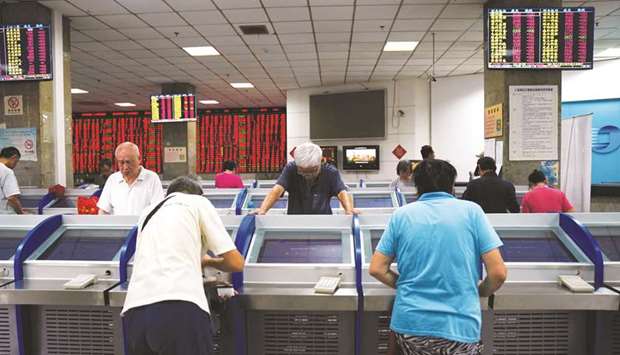Asian markets fell yesterday as profit-takers stepped in following a recent run-up, while a report fuelled worries about the progress of China-US trade talks.
While there were few catalysts to drive business and Wall Street was closed for a holiday investors are keeping tabs on developments in various issues including the US government shutdown, Brexit and China’s stuttering economy.
The optimism surrounding the trade talks was jolted by a Bloomberg News report that said the two sides were struggling to reach agreement on the crucial matter of intellectual property, which is a key source of anger in Washington.
Also, China’s Xinhua news agency reported that President Xi Jinping had told top provincial leaders the Communist party “is facing long-term and complex tests in terms of maintaining long-term rule, reform and opening-up”. The comments suggest he is growing worried about the effects of slowing economic growth.
While headlines regarding talks earlier this month were upbeat, and eyes turn to another meeting including China’s top negotiator Liu He at the end of January, the Bloomberg story, referencing unnamed sources, provided a reality check.
“Recent signs suggest that China is struggling to sustain economic momentum, and risks of a hard landing are rising.
If China falls back to earth, we will all feel the tremor,” economists at Northern Trust said in a note.
Hong Kong was down 0.7% at 27,005.45, while Shanghai finished 1.2% lower at 2,579.70.
Tokyo skidded 0.5% to 20,622.91, along with Sydney while Singapore was 0.4% off and Seoul dropped 0.3%.
Wellington, Mumbai and Manila were also well down.
Concerns about the outlook led the International Monetary Fund to lower its growth forecasts for the global economy, citing the trade row, Brexit and other problems.
On currency markets the pound edged down against the dollar, having bounced on Monday after British Prime Minister Theresa May said she would try to hammer out changes to her Brexit deal that was roundly rejected by MPs last week.
While there is no plan in place to leave the EU on March 29, markets are confident lawmakers will avoid a damaging no-deal Brexit, with options being touted including a delay to the leaving date and another referendum.
The opposition Labour Party leader Jeremy Corbyn has backed plans for a vote in parliament on another referendum.
The pound “has been helped by ongoing optimism that a hard Brexit will be avoided on 29th March”, said Ray Attrill, strategist at National Australia Bank.
He pointed out that MPs from both sides of the aisle had proposed a bill pushing for a delay if an agreement cannot be agreed in parliament by February 26. “There’s a good chance this gets up.
If so, it further flattens the tail risk of a hard Brexit on March 29, though note all 27 EU nations will need to agree to an extension, so it wouldn’t eliminate the risk completely,” Attrill added.
Oil prices extended Monday’s losses that came in response to data showing China’s economy grew last year at its slowest pace for almost three decades.

Investors look at computer screens showing stock information at a brokerage house in Shanghai. The Shanghai Stock Exchange index finished 1.2% lower at 2,579.70 points yesterday.
